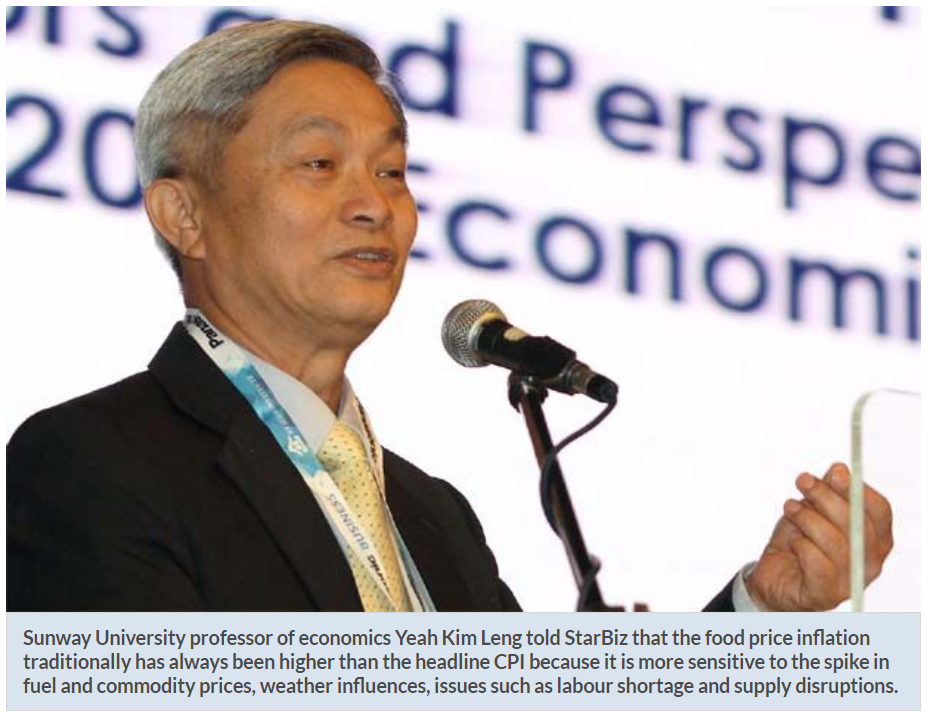Malaysia: Food inflation will continue to rise if efficiency is not addressed
MALAYSIA registered a deflation in 2020, the first time it saw a decline in general prices in 51 years.
Deflation is a general decline in prices for goods and services, which should give more purchasing power to consumers.
However, Malaysians continue to feel the pinch of a higher cost of living. This is because, last year, food prices rose 1.4% compared to a 1.2% year-on-year drop in the consumer price index (CPI), which is used to measure inflation.
Sunway University professor of economics Yeah Kim Leng says that the food price inflation traditionally has always been higher than the headline CPI because it is more sensitive to the spike in fuel and commodity prices, weather influences, issues such as labour shortage and supply disruptions.
“Food prices were also affected by the low efficiency and productivity of the farmers. For Malaysia, domestic food price trends have fluctuated higher than headline inflation due to low farm yields, lack of productivity improvements and rising production costs, ” he tells StarBizWeek.
It is noteworthy that the issue of rising food prices is not unique to Malaysia.
The Covid-19 pandemic is a global health crisis that has turned into an economic crisis impacting many industries including the agriculture sector.
While the supply of food has held up well to date, the prices have surged significantly.
The Economist magazine also reported that the world’s food prices have surged to a six-year high in December and will likely keep rising going into 2021.
Food prices have jumped 18% since last May following adverse weather conditions and government measures to safeguard supplies. Robust demand has helped fuel rallies across agricultural commodities from grains to palm oil.
While Malaysia is one of the largest producers of edible oil in the form of palm oil, the country is a net importer of food products excluding edible oils.
Malaysia imported almost RM50bil worth of food in 2019 from RM38.8bil in 2012. The import bill is likely to go higher if food security is not addressed, coupled with the growing consumer appetite for imported food.
Agroz Group Sdn Bhd founder Gerard Lim Kim Meng says that Malaysia has been exporting its high-grade crops leaving locals with lesser quality ones.
At the same time, Malaysia has also been a net importer of vegetables and fruits to meet the local demand and preferences, he says.
“Some of the imported fruits and vegetables are cheap but when demand is high, their price will also go up.
“We need some kind of control where certain types of vegetables and fruits must be sold to locals first, ” he says. He points to the case of local chilli farms who often feel the heat when the market is flooded with imported chilis. This forces local farmers to lower their prices and some opt out of planting that crop.
Lim also says it’s time for the local agriculture industry to embrace digitalisation and technology to increase yields and productivity.
“We need to look at agriculture as food security where food is accessible to all at an affordable price, ” he says.
Meanwhile, Sunway Group chief innovation officer and Sunway iLabs director Matt van Leeuwen (pic below) says increasing food security through more food production spaces is one way to address the fluctuations of food prices.
“Urban farming has rapidly moved from being a ‘fringe interest’ to a national priority as the urban population continues to increase and as we are heavily relying on imported food from other countries.
“Such a situation begs the question – how are we able to feed our growing population with safe food without using more land while lowering carbon emissions?
“The burden of finding such solutions must not rest solely on the shoulders of our government and private sectors, but also on the consumers, as their actions and buying behaviour can have a massive impact on the sustainable growth of the agriculture sector, ” he says.
In addition, he believes that there is also a need for market transparency provided to the farmers so that they can be prepared to plant according to market demands, and thereby reduce food wastage as well.
“Growing the agriculture sector should go hand in hand with sustainable development, as we all have a role to play in ensuring the future of our planet, ” he adds.
Source: https://www.thestar.com.my/business/business-news/2021/04/17/food-inflation-will-continue-to-rise-if-efficiency-is-not-addressed


 Thailand
Thailand





